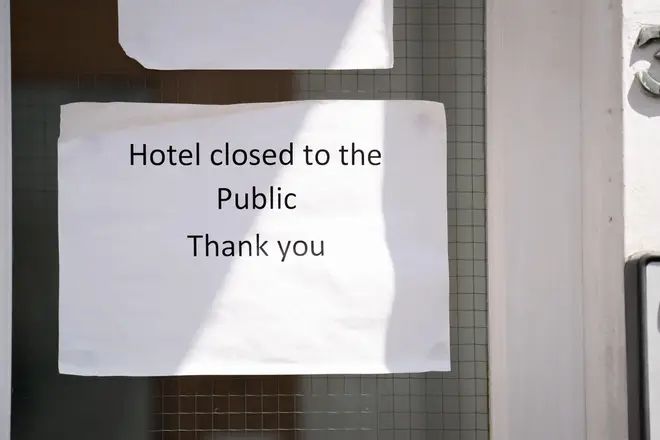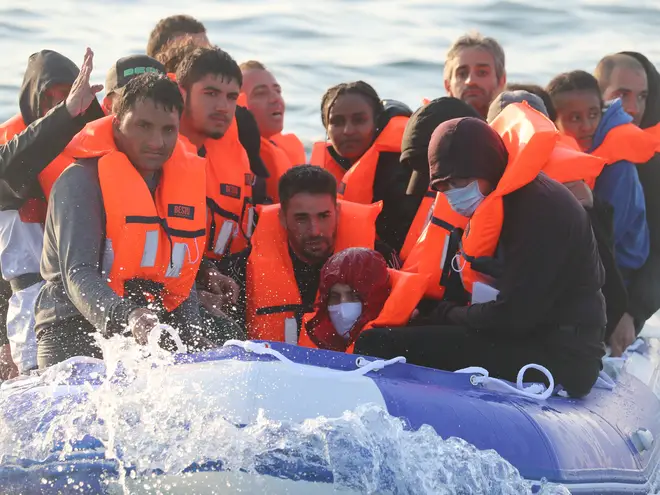
Ali Miraj 12pm - 3pm
11 July 2023, 06:34 | Updated: 11 July 2023, 09:44

The Home Office is spending £500,000 a day on 5,000 empty hotel beds as a “buffer” for higher than expected migrants crossing the Channel, a senior official has revealed.
The Government faces further parliamentary hurdles as its Illegal Migration Bill returns to the Commons, despite announcing new amendments to quell safeguarding concerns for detained children and pregnant women.
MPs are set to vote later on changes backed by the House of Lords after the draft legislation suffered 20 defeats in the upper chamber.
It comes as MPs heard the Home Office is paying for thousands of empty hotel beds reserved for migrants to avoid overcrowding at processing centres.

Asylum seekers should not have the 'audacity' to complain about sharing hotel rooms, caller says
Home Office second permanent secretary Simon Ridley told the Commons Public Accounts Committee the Government department keeps a "buffer" of about 5,000 beds across the country in case of a sudden influx of Channel crossings in a bid to avoid more problems with overcrowding at the Manston processing centre in Kent.
He later added: "We have got excess beds that we are paying for that we can move people into immediately," to which MPs expressed surprise at the number set aside.
It has been revealed the Home Office is already spending £6 million a day on housing 51,000 asylum seekers in nearly 400 hotels or other contingency accommodation such as hostels.
Some 1,339 migrants have reached the UK in small boats in the last three days, taking the total of Channel migrants for this year to 12,772. That’s just four per cent lower than by this time last year.
The news comes as almost 10,000 small-boat migrants who reached Britain in the past four months were handed an "amnesty" from the Government's tough new immigration measures.
Home Secretary Suella Braverman had previously said any migrants who arrived since March by "irregular" routes – such as on dinghies across the Channel – would be barred from making asylum claims.
But in a major concession to get the Government's Illegal Migration Bill through Parliament, it will now apply only to migrants who reach the UK after the legislation gains Royal Assent.
Home Office chief Mr Ridley said the traditional peak of arrivals was in July, August and September, which meant it was “definitely a possible scenario” that numbers this year would surpass last year’s record total of 45,755.

He told MPs: “We are making sure we have a buffer as close to 5,000 beds as we can so we always have an outflow. We are carrying a large number of empty beds in order to let us move people out [of Manston].”
He said arrivals were “unpredictable,” citing this weekend when more than 1,300 arrived in three days, many of whom were being moved into “buffer” hotels dotted around the country before being transferred to more permanent hotels.

'You keep saying you'll stop the boats - but the boats are still coming?' Shelagh Fogarty dismisses the government's Rwanda Policy
The Home Office offered a series of concessions on Monday evening, including limits on the detention of unaccompanied children, who will be granted immigration bail after eight days rather than the current proposed 28.
Another change will prevent people who have already entered the UK without permission from being removed retrospectively after the legislation receives royal assent.
The Government will also keep the current limit of 72 hours on the detention of pregnant women - though this can be extended to seven days on the authorisation of a minister.
It comes after the Bill was mauled in the Lords, where peers demanded a series of revisions including modern slavery protections and asylum help for unaccompanied children.
The defeats raised the prospect of a prolonged stand-off between peers and the Government during so-called parliamentary ping-pong, when legislation is batted between the Lords and Commons.
The Government is expected to seek to overturn many of the amendments, but said on Monday it has accepted some changes in an attempt to ease the Bill's passage through Parliament.
The Government still faces potential challenges despite the changes, with Theresa May and Iain Duncan Smith among senior Conservatives to air concerns that the legislation must go further in offering modern slavery protections.
The Bill is central to Rishi Sunak's pledge to "stop the boats" - one of five key commitments for his leadership - which remains mired in difficulties.
It aims to ensure those who arrive in the UK without Government permission will be detained and promptly removed, either to their home country or a third country, such as Rwanda.
But critics have argued it is morally unacceptable and unworkable, and the Rwanda plan is now set for a battle at the Supreme Court.
Mr Sunak has said he is "throwing everything" at the pledge and insisted the Government remains "confident" that the plan is the "fair" and "right" way forward, while Home Secretary Suella Braverman said Monday's amendments would "help this crucial legislation pass through Parliament swiftly".